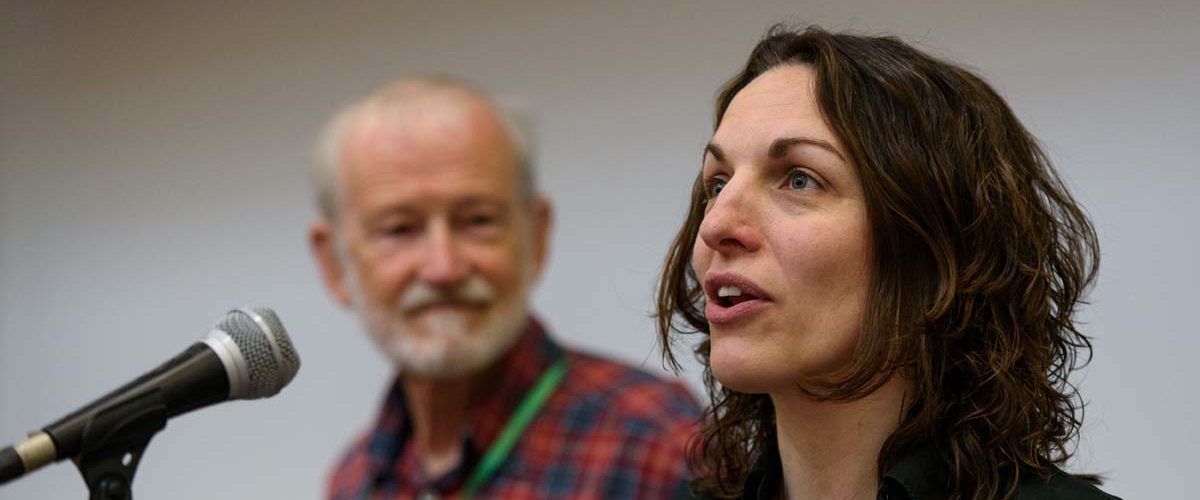Sarah Atkinson is Professor of Screen Media at King’s College London and co-editor of Convergence: The International Journal of Research into New Media Technologies. Sarah has published widely on the impacts of digital technologies on cinema audiences and film production practices. She has undertaken extensive work into the Live Cinema economy and is has worked on a number of funded immersive media projects (AHRC/EPSRC, SSHRC & Innovate UK). She is currently co-investigator on the international project ‘ReFig – Refiguring Innovation in Games’ leading on mixed reality and virtual reality research initiatives.
Helen W. Kennedy is Professor of Creative and Cultural Industries at the University of Nottingham. Her research interests are feminist games culture, innovations in experience design and the cultural evaluation of live experiences. She is lead researcher on REFIG – an international project that seeks to transform the games industry, games education and games culture funded by the Social Science & Humanities Research Council of Canada. She has published widely in game studies and the emergent field of live cinema where her work focuses on the intersections between performance, play and narrative in the design and experience of immersive cinema.
Our collaborative research in Live Cinema began with a call for papers by G|A|M|E – the Italian Journal of Game Studies – in 2014, for a special issue entitled ‘Re-framing video games in the light of cinema. With our overlapping interest in innovative interactive stories, emergent audience behaviours, the evolution of new aesthetics and complex affective experiences; this seemed a perfect opportunity to collaborate. Drawing on our distinct backgrounds in cinema studies and game studies, we were keen to explore the experience design strategies of Secret Cinema in particular, as this was an organization Sarah had profiled in her earlier monograph Beyond the Screen which she was writing in 2012/2013.
Secret Cinema were clearly emerging as an organization of particular significance in relation to innovative practices in cinema distribution and exhibition. We purchased tickets for their screening of Back to the Future, their most elaborate immersive experience to date. Unfortunately, the process of this was fraught with difficulties and delays and what was most interesting was watching the backlash which unfolded as a result. Die-hard Back to the Future fans and Secret Cinema fans clashed on social media. As known researchers in the area we were telephoned by the press – the Independent, BBC Radio, BBC News Night and later by Le Monde – all requesting interviews – the details of the opening night failure made headlines in online versions of the mainstream news media.
Our initial proposition of a single article in this area soon expanded as we shaped another set of arguments and observations, one of which we presented at SCMS in Montréal in 2015, with the title of ‘Not So Secret Cinema: When Independent Immersive Cinematic Events Go Mainstream’. It was quickly becoming apparent that this was a growing area of creative and commercial significance, and one worthy of further academic enquiry.
We had successfully pitched for a Special Issue of Participations to capture emergent work in this area and it was there at SCMS that we spread the word and publicized our call for contributions with a publication date in 2016. We had adopted the catch all title ‘Live Cinema’ (a term taken from the Secret Cinema Back to the Future advertising – ‘The Live Cinema Experience’) as an umbrella term through which to capture the broad range of emergent creative art practices and novel commercial strategies that we were identifying.
Around this point in 2015, Lisa Brook from Live Cinema UK contacted us, enthusiastic about our work and seeking to enlist us to her own forthcoming project. Lisa was at that moment poised to submit an Arts Council England application to research, document and chart what she also described as Live Cinema as an emergent but increasingly popular and significant area of creative practice across the UK and she hoped to be able to enlist us as academic partners.
Our first venture was a symposium bringing together connections from different related disciplines and organisations. This became the Live Cinema Network – a network of practitioners, creative producers and academics exploring the industry. We have since hosted several events and are continuing to publish, as part of the ongoing Live Cinema Project.
